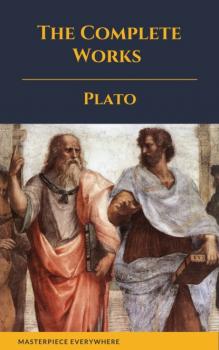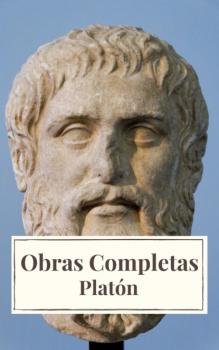Plato
Список книг автора PlatoPlato: The Complete Works
Plato (428/427–348/347 BCE) was a Greek philosopher and mathematician of the Classic Age who founded the Academy of Athens. Noted as a student of Socrates, Plato has distinguished himself as one of the founders of Western philosophy by recording the teachings of his master and his own philosophies in 35 dialogues and 13 letters (some are disputed as spurious).
This collection contains the following works by Plato:
All books translated by Benjamin Jowett Part 1: Early Dialogues The Apology Crito Charmides Laches Lysis Euthyphro Menexenus Ion Gorgias Protagoras Meno Part 2: Middle Dialogues Euthydemus Cratylus Phaedo Phaedrus The Symposium Theaetetus Parmenides Part 3: Late Dialogues Sophist Statesman Philebus Timaeus Critias Part 4: The Republic I: Of Wealth, Justice, Moderation, and their Opposites II: The Individual, the State, and Education III: The Arts in Education IV: Wealth, Poverty, and Virtue V: On Matrimony and Philosophy VI: The Philosophy of Government VII: On Shadows and Realities in Education VIII: Four Forms of Government IX: On Wrong or Right Government, and the Pleasures of Each X: The Recompense of Life Part 5: The Laws Books I–XII
The Republic
Contains Active Table of Contents (HTML) and in the end of book include a bonus link to the free audiobook. Often ranked as the greatest of Plato's many remarkable writings, this celebrated philosophical work of the fourth century B.C. contemplates the elements of an ideal state, serving as the forerunner for such other classics of political thought as Cicero's De Republica, St. Augustine's City of God, and Thomas More's Utopia. Written in the form of a dialog in which Socrates questions his students and fellow citizens, The Republic concerns itself chiefly with the question, «What is justice?» as well as Plato's theory of ideas and his conception of the philosopher's role in society. To explore the latter, he invents the allegory of the cave to illustrate his notion that ordinary men are like prisoners in a cave, observing only the shadows of things, while philosophers are those who venture outside the cave and see things as they really are, and whose task it is to return to the cave and tell the truth about what they have seen. This dynamic metaphor expresses at once the eternal conflict between the world of the senses (the cave) and the world of ideas (the world outside the cave), and the philosopher's role as mediator between the two. High school and college students, as well as lovers of classical literature and philosophy, will welcome this handsome and inexpensive edition of an immortal work. It appears here in the fine translation by the English classicist Benjamin Jowett.
Obras Completas de Platón
Platón (en griego antiguo: Πλάτων, Plátōn; Atenas o Egina, c. 427-347 a. C.) fue un filósofo griego seguidor de Sócrates y maestro de Aristóteles. En 387 fundó la Academia, institución que continuaría su marcha a lo largo de más de novecientos años y a la que Aristóteles acudiría desde Estagira a estudiar filosofía alrededor del 367, compartiendo, de este modo, unos veinte años de amistad y trabajo con su maestro. Platón participó activamente en la enseñanza de la Academia y escribió, siempre en forma de diálogo, sobre los más diversos temas, tales como filosofía política, ética, psicología, antropología filosófica, epistemología, gnoseología, metafísica, cosmogonía, cosmología, filosofía del lenguaje y filosofía de la educación; intentó también plasmar en un Estado real su original teoría política, razón por la cual viajó dos veces a Siracusa, Sicilia, con intenciones de poner en práctica allí su proyecto, pero fracasó en ambas ocasiones y logró escapar penosamente y corriendo peligro su vida debido a las persecuciones que sufrió por parte de sus opositores.
Su influencia como autor y sistematizador ha sido incalculable en toda la historia de la filosofía, de la que se ha dicho con frecuencia que alcanzó identidad como disciplina gracias a sus trabajos. Alfred North Whitehead llegó a comentar:
La caracterización general más segura de la tradición filosófica europea es que consiste en una serie de notas a pie de página de Platón.
Alfred North Whitehead (1929)
Plato: The Complete Works (31 Books)
Plato was a philosopher in Ancient Greece. He was an essential figure in the development of philosophy, especially the Western tradition, and he founded the Academy in Athens, the first institution of higher learning in the Western world.
Plato's dialogues have been used (and are still used) to teach a range of subjects, including philosophy, logic, ethics, rhetoric, religion and mathematics. His lasting themes include Platonic love, the theory of forms, the five regimes, innate knowledge, among others. His theory of forms launched a unique perspective on abstract objects, and led to a school of thought called Platonism.
This collection contains the following works by Plato:
Early Works •Apology •Charmides, or Temperance •Crito •Euthyphro •Gorgias •Hippias, Lesser •Hippias, Greater •Ion •Laches •Lysis •Protagoras
Transitional Works •Cratylus •Euthydemus •Meno •Parmenides •Phaedo •Phaedrus •Symposium •The Republic
Middle Works •Theaetetus
Late Works •Critias •Laws •Philebus •Sophist •Statesman •Timaeus
Works of Disputed Authorship •Alcibiades I & II •Eryxias •Menexenus •Theages
Plato: The Complete Works (31 Books)
Plato was a philosopher in Ancient Greece. He was an essential figure in the development of philosophy, especially the Western tradition, and he founded the Academy in Athens, the first institution of higher learning in the Western world.
Plato's dialogues have been used (and are still used) to teach a range of subjects, including philosophy, logic, ethics, rhetoric, religion and mathematics. His lasting themes include Platonic love, the theory of forms, the five regimes, innate knowledge, among others. His theory of forms launched a unique perspective on abstract objects, and led to a school of thought called Platonism.
This collection contains the following works by Plato:
Early Works •Apology •Charmides, or Temperance •Crito •Euthyphro •Gorgias •Hippias, Lesser •Hippias, Greater •Ion •Laches •Lysis •Protagoras
Transitional Works •Cratylus •Euthydemus •Meno •Parmenides •Phaedo •Phaedrus •Symposium •The Republic
Middle Works •Theaetetus
Late Works •Critias •Laws •Philebus •Sophist •Statesman •Timaeus
Works of Disputed Authorship •Alcibiades I & II •Eryxias •Menexenus •Theages
Obras Completas de Platón
Platón (en griego antiguo: Πλάτων, Plátōn; Atenas o Egina, c. 427-347 a. C.) fue un filósofo griego seguidor de Sócrates y maestro de Aristóteles. En 387 fundó la Academia, institución que continuaría su marcha a lo largo de más de novecientos años y a la que Aristóteles acudiría desde Estagira a estudiar filosofía alrededor del 367, compartiendo, de este modo, unos veinte años de amistad y trabajo con su maestro. Platón participó activamente en la enseñanza de la Academia y escribió, siempre en forma de diálogo, sobre los más diversos temas, tales como filosofía política, ética, psicología, antropología filosófica, epistemología, gnoseología, metafísica, cosmogonía, cosmología, filosofía del lenguaje y filosofía de la educación; intentó también plasmar en un Estado real su original teoría política, razón por la cual viajó dos veces a Siracusa, Sicilia, con intenciones de poner en práctica allí su proyecto, pero fracasó en ambas ocasiones y logró escapar penosamente y corriendo peligro su vida debido a las persecuciones que sufrió por parte de sus opositores.
Su influencia como autor y sistematizador ha sido incalculable en toda la historia de la filosofía, de la que se ha dicho con frecuencia que alcanzó identidad como disciplina gracias a sus trabajos. Alfred North Whitehead llegó a comentar:
La caracterización general más segura de la tradición filosófica europea es que consiste en una serie de notas a pie de página de Platón.
Alfred North Whitehead (1929)
Epistles - Seventh Letter
"Epistles – Seventh Letter" by Plato (translated by George Burges). Published by Good Press. Good Press publishes a wide range of titles that encompasses every genre. From well-known classics & literary fiction and non-fiction to forgotten−or yet undiscovered gems−of world literature, we issue the books that need to be read. Each Good Press edition has been meticulously edited and formatted to boost readability for all e-readers and devices. Our goal is to produce eBooks that are user-friendly and accessible to everyone in a high-quality digital format.
Greater Hippias
"Greater Hippias" by Plato (translated by Benjamin Jowett). Published by Good Press. Good Press publishes a wide range of titles that encompasses every genre. From well-known classics & literary fiction and non-fiction to forgotten−or yet undiscovered gems−of world literature, we issue the books that need to be read. Each Good Press edition has been meticulously edited and formatted to boost readability for all e-readers and devices. Our goal is to produce eBooks that are user-friendly and accessible to everyone in a high-quality digital format.
Obras Completas de Platón
Platón (en griego antiguo: Πλάτων, Plátōn; Atenas o Egina, c. 427-347 a. C.) fue un filósofo griego seguidor de Sócrates y maestro de Aristóteles. En 387 fundó la Academia, institución que continuaría su marcha a lo largo de más de novecientos años y a la que Aristóteles acudiría desde Estagira a estudiar filosofía alrededor del 367, compartiendo, de este modo, unos veinte años de amistad y trabajo con su maestro. Platón participó activamente en la enseñanza de la Academia y escribió, siempre en forma de diálogo, sobre los más diversos temas, tales como filosofía política, ética, psicología, antropología filosófica, epistemología, gnoseología, metafísica, cosmogonía, cosmología, filosofía del lenguaje y filosofía de la educación; intentó también plasmar en un Estado real su original teoría política, razón por la cual viajó dos veces a Siracusa, Sicilia, con intenciones de poner en práctica allí su proyecto, pero fracasó en ambas ocasiones y logró escapar penosamente y corriendo peligro su vida debido a las persecuciones que sufrió por parte de sus opositores.
Su influencia como autor y sistematizador ha sido incalculable en toda la historia de la filosofía, de la que se ha dicho con frecuencia que alcanzó identidad como disciplina gracias a sus trabajos. Alfred North Whitehead llegó a comentar:
La caracterización general más segura de la tradición filosófica europea es que consiste en una serie de notas a pie de página de Platón.
Alfred North Whitehead (1929)
Plato: The Complete Works (31 Books)
Plato was a philosopher in Ancient Greece. He was an essential figure in the development of philosophy, especially the Western tradition, and he founded the Academy in Athens, the first institution of higher learning in the Western world.
Plato's dialogues have been used (and are still used) to teach a range of subjects, including philosophy, logic, ethics, rhetoric, religion and mathematics. His lasting themes include Platonic love, the theory of forms, the five regimes, innate knowledge, among others. His theory of forms launched a unique perspective on abstract objects, and led to a school of thought called Platonism.
This collection contains the following works by Plato:
Early Works •Apology •Charmides, or Temperance •Crito •Euthyphro •Gorgias •Hippias, Lesser •Hippias, Greater •Ion •Laches •Lysis •Protagoras
Transitional Works •Cratylus •Euthydemus •Meno •Parmenides •Phaedo •Phaedrus •Symposium •The Republic
Middle Works •Theaetetus
Late Works •Critias •Laws •Philebus •Sophist •Statesman •Timaeus
Works of Disputed Authorship •Alcibiades I & II •Eryxias •Menexenus •Theages









